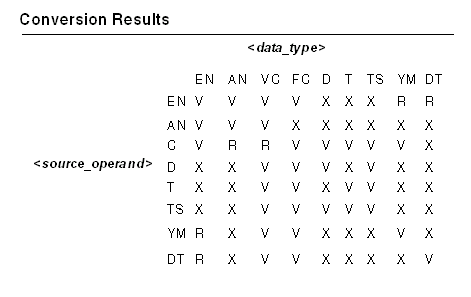
MULTISET informs Oracle Database to take the result set of the subquery and return a collection value. Table 5-shows which built-in datatypes can be cast into which other built-in datatypes. CAST does not support LONG, LONG RAW, or the Oracle -supplied types. TO_ TIMESTAMP converts char of CHAR, VARCHAR NCHAR, or NVARCHARdatatype to a value of TIMESTAMP datatype.
The optional fmt specifies the format of char. If you omit fmt, then char must be in the default format of the TIMESTAMP datatype, which is determined by the NLS_ TIMESTAMP _FORMAT initialization parameter. If not, post a little sample data (CREATE TABLE and INSERT statements, relevant columns only) for all tables, and also post the you want from that data.
TO_CHAR() and TO_DATE() from TIMESTAMP WITH. Using CAST to TIMESTAMP in Where clause for. How to Convert Timestamp to Date Format in Oracle. Hi, I want to convert below timestamp to date in Oracle.
The Oracle CAST function is quite powerful, but it can be hard to use. Learn how to use it and what it can do in this article. Purpose of the Oracle CAST Function. The purpose of the Oracle CAST function is to convert one data type to another. But when you say when we have TRUNC for both timestamp and date for other granularities.
We are relying on the automatic datatype conversion (something I hate, and wish we had a setting to disable it). Hi guys just a simple issue, how does one convert Oracle Timestamp to Date ? I have a table where I have a timestamp column. To convert a DATE to a TIMESTAMP do the following. Oracle uses the NLS_ TIMESTAMP _FORMAT parameter to control the default timestamp format when a value of the character type is converted to the TIMESTAMP data type.
Noted that the DECODE() function returns the third argument if the first second equals the second argument, otherwise, it returns the fourth argument. It is a good practice to use the TIMESTAMP WITH TIME ZONE data type for the application that stores across time zones e. Now, a TIMESTAMP value is a type of date. Oracle for Absolute Beginners: Date, Timestamp and Interval All databases stand on a tripod of datatypes: strings, numbers and dates. And though they might dress them in fancy clothing – varchar clob, float, integer – strings are really just strings, and numbers are really just numbers.
DATE, TIMESTAMP oder sogar TIMESTAMP WITH TIME ZONE? Und wie wichtig sind Formatmasken? Dieser Artikel gibt einen Überblick über die verschiedenen Datentypen und zeigt auf, wie man in APEX mit Formatmasken arbeitet. Actually, there is not one, not two but four data types for datetime values in the Oracle database: DATE is the oldest and most widely used data type.

Though the name is DATE, it stores also information about the time. Oracle has expanded on the DATE datatype and has given us the TIMESTAMP datatype which stores all the information that the DATE datatype stores, but also includes fractional seconds. As you can see, there is a fractional. Oracle TO_TIMESTAMP function : TO_ TIMESTAMP () function returns converts CHAR, VARCHAR NCHAR, or NVARCHARdatatype to a value of TIMESTAMP datatype. This tutorial explains how to use the TO_ TIMESTAMP function with syntax, parameters, examples and explanation.
In SQL Server, you can use CONVERT or CAST functions to convert a datetime value (DATETIME, DATETIMEdata types i.e.) to a string. PM How do i convert this to a date format? I tried using the TO_DATE function, but no luck.
I discovered your weblog the use of msn. That is an extremely well written article. The CAST function can convert built-in and collection-typed values into other built-in or collection typed values. CAST can convert a date or other unnamed operand (or a nested table or other named collection) into a type-compatible datatype or named collection.
Select all Open in new window. I Known that I must use to_ timestamp , but I can´t find the solution. Ex: in Oracle , we have the trunc option. Is there any such thing in DB2?
No comments:
Post a Comment
Note: only a member of this blog may post a comment.